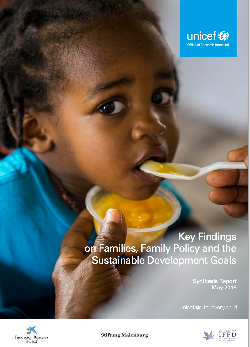Dominic Richardson, Esuna Dugarova, Daryl Higgins, Keiko Hirao, Despina Karamperidou, Zitha Mokomane, Mihaela Robila. 2019. Families, Family Policy and the Sustainable Development Goals. UNICEF Office of Research – Innocenti
地球環境学研究科地球環境学専攻 平尾 桂子 教授
- 研究

【研究の概要】
Governments worldwide are increasingly enacting family policies, which include cash transfers, child allowances, maternity / parental leave, and preschool education and care policies. It is because they recognize the role of families as an elementary unit of society. How do family policies affect different social progress goals defined in the SDGs in different parts of the world? Which family attributes at household impact the effectiveness of the previously identified family interventions?
This report tries to answer these questions by reviewing the literature on policy assessment on poverty reduction (SDG 1), improvements in health (SDG 3), inclusiveness in education (SDG 4), gender equality (SDG 5), youth employment (SDG 8), and reduction in violence (SDG 16). The findings show that family-focused interventions are most often positively evaluated. This may reflect, to some degree, a publication bias towards significant results. This research also found complementarities and trade-offs between individual family policies aligned to specific SDGs.

Families, Family Policy and the Sustainable Development Goals
Could families be the key to achieving the SDGs?
As we approach the deadline for the SDGs, a new report highlights the importance of strong family policies in order to meet these targets.
Families Key for Fairer Future
COVID-19 has disrupted the first year of the final decade of action to achieve the SDGs. More than ever, families are key to reaching these goals and strengthening our crisis response.
